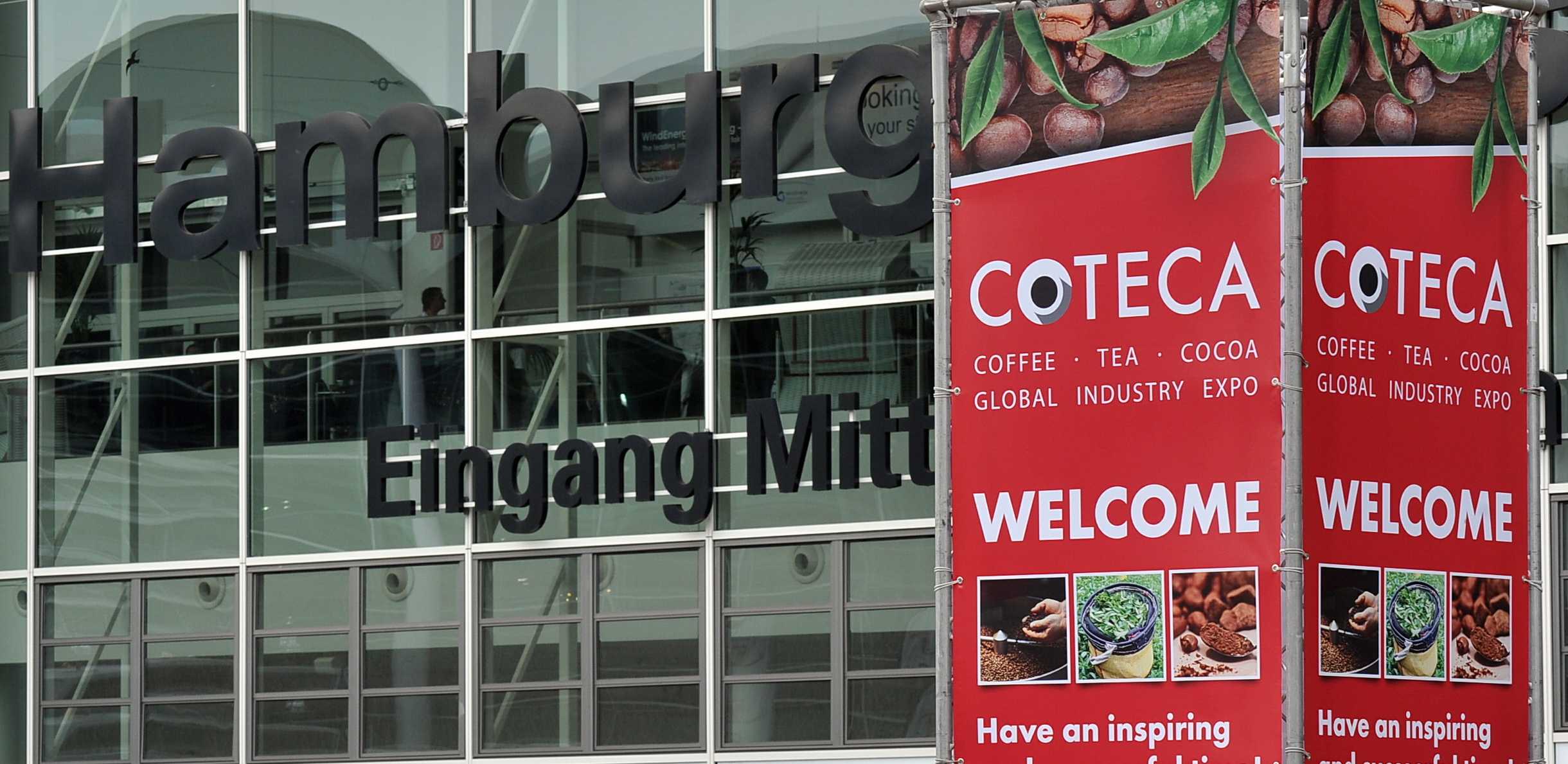HAMBURG, Germany — COTECA in Hamburg from 10 to 12 October 2018 features 200
exhibitors from 40 nations presenting everything related to coffee, tea and cocoa.
The industry expo is not only an international meeting point, but also the ideal platform to get an overview of current global market developments. Alongside countless product innovations, the exhibitors reflect the growing interest in fair-trade products.
Arabica going down, robusta up The market for coffee and cocoa has changed enormously since the last COTECA two years ago.
Some 159 million bags of coffee were grown in 2017/2018, that is 1.2% more than the previous year. While arabica production was down 4.9% to 97.43 million bags, robusta production rose strongly by 12.1% to 62.24 million bags.
All in all, eight of the ten major coffee growing countries increased their coffee production, and only South America was down, delivering 6.1% less coffee than the previous year1.
Germany imported some 105,580 tonnes of coffee in April 2018 alone, and worldwide coffee exports totalled some 128.9 million bags.
The world market price of coffee in this period was lower than expected, despite good supply and demand, hitting its lowest level since 2007. Experts forecast stabilisation of the coffee price2.
Quality over quantity
Fair trade with coffee is changing the global market. 18,367 tonnes of fair-trade coffee were sold in Germany in 2017, according to TransFair e.V. That is up 8% year-on-year, with fair-trade accounting for 4.1% of the overall coffee market.
Coffee is the most important consumer good segment in fair trading. And FairTrade is often followed by further certification – some three quarters (77%) of the FairTrade coffee sold in Germany comes from ecological growing.
As noted by Carola Muschke, responsible for trade and investment of the Peru Business and Trade Bureau, and an exhibitor at COTECA, “Peru is the second largest grower and exporter of organic coffee worldwide.
The trend is towards quality rather than quantity. Certified products and selected speciality coffees are a strength of Peru.” Certification such as “UTZ Certified Good Inside”,
Rainforest Alliance Certified, Fairtrade, Cup of Excellence, or the EU Label are useful identifiers for consumers.
Sustainability on track for success with cocoa
The percentage of sustainably grown cocoa in the German market for chocolates and
confectionery has risen dramatically from 3% in 2011 to 55% in 2017. Last year alone, the growth rate was 22%3.
The description “sustainably produced” applies to products certified on the basis of the existing systems UTZ, Rainforest Alliance and Fair Trade, or where sustainable growing is verified within the framework of company programmes meeting similar requirements. Total sales of FairTrade raw cocoa were up to 37,000 tonnes for the first time in 2017, that is an 8% share of the total cocoa market4.
Organic for tea drinkers
There is a clear positive trend in organic tea – the demand for tea (Camellia sinensis) from
controlled organic farming was up significantly, accounting for 9.4% of total consumption5.
The organic share of herbal and fruit infusions was up by 0.3% year-on-year, to 2,556 tonnes6.
Kyra Schaper, PR officer of the German Tea Association and the German Association of Herbal and Fruit Infusions (WKF) notes that “in fact the share is even higher, because conventional blends often contain some organic tea, even though they cannot be labelled as ‘organic’”.
Direct trade and active assistance for producers in countries of origin
In Germany, smaller traders and roasters in particular go for fair-trade and direct-trade raw materials for speciality coffees.
Exhibitor PachaMama from Peru goes with this trend – their coffee comes in the shortest and most transparent trade route “straight from the farm”, so that coffee farmers receive considerably more than the current market price.
Small direct traders and exporters such as Meambar with green coffee from Honduras are present at COTECA.
Green coffee supplier Gollücke & Rothfos sees itself as an interface between coffee farmers in the countries of origin and roasters in Germany.
The company uses its farmers’ programme “VOLCAFE WAY” to show coffee farmers how to analyse their production costs and improve efficiency, highlight the quality of the coffee, and thus get good prices for their product.
Data-based decisions becoming more and more important
Professionalisation of individual businesses is the service provided by software house Cropster. Roasters, chocolatiers, traders and producers are increasingly making their decisions on the basis of structured data points and information, so they need smarter solutions.
Sales Manager Andreas Benedikter from Cropster says: “Data-based decisions are a trend that we can see right across the coffee, tea and cocoa industries.
Roasters that keep a central database of all the production relevant data such as roasting profiles, green coffee information, and tasting results, establish themselves over the years as industry leaders”.
All in all, it is evident that the processing industries and also the consumers are demanding more and more information on sustainable growing, fair trade, and quality.
Trade visitors at COTECA are looking for information on this and other current developments.
Alongside the great product diversity, there are various side events such as coffee
cuppings, tea tastings and workshops, making COTECA a unique international industry meeting point in Hamburg, the coffee capital.
1 Coffee Market Report, International Coffee Organization
2 United States Department of Agriculture (USDA)
3 Annual Report 2017/2018, German Cocoa Trade Association
4 Cocoa Market Review (5/2018), International Cocoa Organization
5 The German Tea Market 2018, German Tea Association, Hamburg
6 German Association of Herbal and Fruit Infusions (WKF)


















